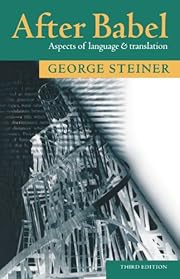

Klik op een omslag om naar Google Boeken te gaan.
|
Bezig met laden... After Babel: Aspects of Language and Translation (1975)door George Steiner

Bezig met laden...
Meld je aan bij LibraryThing om erachter te komen of je dit boek goed zult vinden. Op dit moment geen Discussie gesprekken over dit boek.   ) )George Steiner's classic study of the peculiar nature of translation as a literary and linguistic process, which drags you through some fairly knotty thickets of the philosophy of language before opening up in the last couple of chapters into a string of brilliant case-studies. We get to think about why there are different languages in the first place, and about how — since the meaning of words shifts between contexts, times and individuals — any reading of a text anywhere is going to involve some kind of translation. And we get to confront the paradox that whilst an "exact" 1:1 translation between different languages, even of the most trivial phrase, is clearly impossible, we still use translations every day and find them helpful. Even the most complex and baffling literary texts have been translated in ways that seem to serve a useful purpose for readers and scholars. This is something of a literary steeple-chase, where we are expected to cope with references from a broad range of literature, linguistics, philosophy and other disciplines (in numerous different languages). At one point we leap straight from a detailed discussion of prophecy in the Old Testament to a (non-trivial) excursion into statistical thermodynamics and the Second Law. So you will need that parachute. But it is fun, and when we get to the case-studies of how literary translation is actually done it is also very useful. For those who do Translation Studies, are translators, or are doing anything comparative in their post-secondary education, this book is a must-read. It gives a detailed, comprehensive history of the practice of translation, beginning with its roots in biblical studies. Steiner never quite looses sight of the spiritual aspects of translation, in the religious and post-Hegelian sense of the word. He writes an especially adept analysis of Walter Benjamin's "The Task of the Translator" that clarifies Benjamin's somewhat murky text, making it accessible and, moreover, *useful* for the translator-scholar. I recommend getting the most recent edition, and not buying a used copy of an older addition, as the introductions to the new editions generally amend and add information to the original text which was written in the '70s, I believe. All in all, this book should be on the shelf of anyone interested in "world literature"--i.e. literature in translation--because it is essential that we question the efficacy of translation, its necessity, its drawbacks, and the ways it enriches our understanding of language, society and art. geen besprekingen | voeg een bespreking toe
"A brilliant work . . . A dazzling meditation on the very nature of language itself" from the world-renowned scholar and author of The Poetry of Thought (Kirkus Reviews). In his classic work, literary critic and scholar George Steiner tackles what he considers the Babel "problem": Why, over the course of history, have humans developed thousands of different languages when the social, material, and economic advantages of a single tongue are obvious? Steiner argues that different cultures' desires for privacy and exclusivity led to each developing its own language. Translation, he believes, is at the very heart of human communication, and thus at the heart of human nature. From our everyday perception of the world around us, to creativity and the uninhibited imagination, to the often inexplicable poignancy of poetry, we are constantly translating--even from our native language. Geen bibliotheekbeschrijvingen gevonden. |
Actuele discussiesGeenPopulaire omslagen
 Google Books — Bezig met laden... Google Books — Bezig met laden...GenresDewey Decimale Classificatie (DDC)418.02Language Linguistics Standard usage (Prescriptive linguistics) TranslatingLC-classificatieWaarderingGemiddelde: (3.84) (3.84)
Ben jij dit?Word een LibraryThing Auteur. |
||||||||||||||||||||||||||||||||||||||||||||||||||||||||||||||||||||||||||||||||||||||||||||||||||||||||||||||||||||||||||